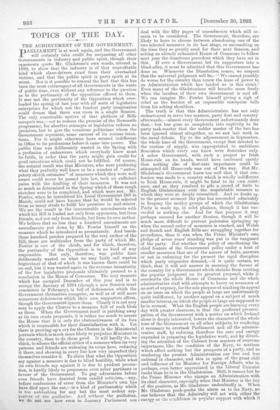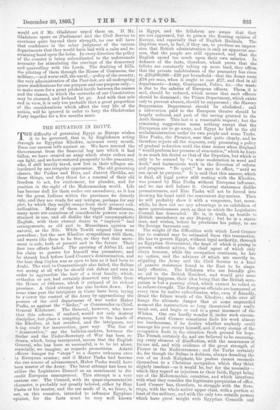TOPICS OF THE DAY.
THE ACHIEVEMENT OF THE GOVERNMENT. PARLIAMENT is at work again, and the Government will certainly take credit for surpassing all other Governments in industry and public spirit, though their opponents quote Mr. Gladstone's own words, uttered in 1888, to show that the industry is of that unprofitable kind which slave-drivers exact from their overtasked victims, and that the public spirit is party spirit at its worst. Nor is it possible to conceal the fact that this has been the most extravagant of all Governments in the waste of public time, even without any reference to the question as to the pertinacity of the opposition offered to them. It was not the pertinacity of the Opposition which over- loaded the spring of last year with all sorts of legislative enterprises for which not the fondest party imagination could. dream that there was room in a single Session. The only conceivable motive of that plethora of Bills manqu6s was,—/tot to redeem the promise of the Newcastle programme, for abortive attempts at legislation redeem no promises, but to give the voracious politicians whom the Government represent, some earnest of its serious inten- tions. For it might otherwise have seemed indifferent in Office to its professions before it came into power. The public time was deliberately wasted in the Spring with a profusion of endeavours which everybody know must be futile, in order that the party might gain credit for good intentions which could not be fulfilled. Of course, the natural result was that Ministers, who were producing what they perfectly well knew to be a number of "antici- patory sketch estimates" of measures which they were well aware could. never be passed into law, took no sufficient pains with the drafting of their measures. It was not so much as determined in the Spring which of these rough sketches were to be completed, and which were not. Mr. Fowler, when he introduced his Local Government Bill in March, could not have known that he would be selected from so many rivals to fulfil his promises in mid-winter. We see the result in the innumerable amendments with which his Bill is loaded not only from opponents, but from friends, and not only from friends, but from its own author. We believe that no less than a hundred amendments are amendments put down by Mr. Fowler himself on the measure which he introduced. so prematurely. And beside those hundred patches prepared by the very author of the Bill, there are multitudes from the party of which Mr. Fowler is one of the chiefs, and for which, therefore, the pertinacity of the Opposition is in no kind of way responsible. Not only, therefore, was public time deliberately wasted. on what we may fairly call wanton beginnings of that of which it was known there could be no end, but it was wasted again in the extreme immaturity of the few legislative proposals ultimately pressed to a conclusion in the House of Commons. The very measure which has occupied December of this year and is to occupy the January of 1894 (though a new Session must commence in February), is full of deficiencies which the Government themselves recognise, as well as of still more numerous deficiencies which their own supporters affirm, though the Government ignore them. Clearly it is not eery easy to apply the Closure to a measure full of such blots as these. When the Government itself is patching away at its own crude proposals, it is rather too much to assure the House that it is only the obstructiveness of its foes which is responsible for their dissatisfaction with it. Yet there is growing up a cry for the Closure in the Ministerial journals which is much more likely to prejudice Ministers in the country, than to do them good. It will hardly do, we think, to silence the official critics of a measure when its very patrons and friends are widening its scope ]sere, reducing it there, and showing in every line how very imperfect they themselves consider it. To claim that what the Opposition say against a measure is due to blind hostility, while what its own friends say against it is due to prudent precau- tion, is hardly likely to prepossess even sober partisans in favour of the Government. To gag adversaries before even friends have desisted from candid criticism, nay, before confessions of error from the Minister's own lips have died upon the ear,—is a kind of partisanship which 3s tee 'unblushing for any but the most ardent sup- porters of the guillotine. And without the guillotine, we do not see how even in January Parliament can deal with the fifty pages of amendments which still re- main to be considered. The Government, therefore, are' likely to have to choose between abandoning one of the two selected measures in its last stage, or encroaching on. the time they so greatly need for their next Session, and' asking an already exhausted House of Commons to follow next year the disastrous precedent which they have set in this. If ever a Government led its supporters into a• blind-alley, it must be admitted that this Government has. done so. Whenever the Dissolution comes, we suspect. thatthe universal judgment will be,—' We cannot possibly. do worse for the country than renew the lease of power to- an Administration which has landed us in this strait! Even many of the Gladstonians will breathe more freely., when the incubus of their own Government is cast off. We can imagine Mr. Fowler himself giving a sigh of relief as the burden of an impossible enterprise falls. from his aching shoulders.
The truth is that this Administration has not only endeavoured to serve two masters, party first and country afterwards,—almost every Government unfortunately does, that,—but has gone so completely into captivity to its party task-master that the nobler master of the two has, been ignored almost altogether, as we saw last week in the naval debate. Up to the adjournment in September.. the whole time of the Government, except that devoted to the routine of supply, was appropriated to ambitious. flourishes which every one knew were flourishes only. A sober Government, with such a project as Irish Home-rule on its hands, would. have confessed openly that nothing else of first-rate importance could be attempted till Home-rule was out of the way. But Mr.. Gladstone's Government knew too well that if that con- fession was made to a country which is wholly indifferent to Irish Home-rule, it might be fatal to its own exist- ence, and so they resolved. to pile a crowd of baits to English Gladstonians -over the unpalatable measure to. which they were so deeply committed. And no doubt up to the present moment the plan has succeeded admirably in keeping the motley groups of which the Gladstonian. Party is made up, in solid phalanx, though it has suc- ceeded in nothing else. And for that purpose it may perhaps succeed for another Session, though it will be- much more difficult to prevent jealousies springing up-, when the second order of measures is reached, and Welsh and Scotch and English Bills are struggling together for precedence, than it was when the Prune Minister's own pledge of seven years' standing was put in the vanguard of the party. But whether the policy of smothering the chief feature of the Government policy under a host of smaller measures that are of the nature of baits, answers, or not in enforcing for the present the rigid discipline- which party exigencies demand,—it is quite certain, we think, that it will not answer in securing the favour of the country for a Government which shrinks from inviting the popular judgment on its greatest proposal, while it overworks the whole House of Commons and the whole• administrative staff with attempts to hurry on measures of no sort of urgency, for the sole purpose of masking its appeal on an issue on which the people at large are unfortunately quite indifferent, by another appeal on a subject of much. smaller interest, on which the people at large are supposed to be in earnest. What the English people are learning every. day with greater clearness, is that the profound preoccu- pation of the Government with a matter on which Ireland alone is deeply interested, lowers the character of the whole. tone of the Government on all other subjects, by rendering; it necessary to overtask Parliament and all the adminis- trative staff, by reducing therefore the care and energy- expended in preparing the legislative work, and by divert- ing the attention of the Cabinet from matters of supreme- importance, like the condition of the Navy, to matters, which affect nothing but the prospects of a party, and so rendering the present Administration one less and less national in character, and this in spite of the great skill and influence of its Minister for Foreign Affairs, who is, perhaps, even better appreciated in the Liberal Unionist . ranks than he is in the Gladstonian. Still, cannot but be the Prime Minister who stamps an Administration with its chief character, especially when that Minister is the key of the position, as Mr. Gladstone undoubtedly is. When Mr. Gladstone pooh-poohs the alarm as to the Navy, no one believes that the Admiralty will act with either the energy or the cDnfidcncc in popular support with which it would act if Mr. Gladstone urged them on. If Mr. Gladstone spurs on [Parliament and the Civil Service to exertions quite beyond their strength, no one will have that confidence in the sober judgment of the various departments that they would have had with a, calm and re- straining hand upon the helm. In every direction the policy of the country is being subordinated to the 'unfortunate necessity for stimulating the cravings of the democracy and quarrelling with the Lords. The drafting of Bills, the piloting of them through the House of Commons, the military,—and worse still, the naval,—policy of the country, the very administration of the Poor-law, are all undergoing grave modifications for one purpose and one purpose only,— to make room for a great pitched-battle between the masses and the classes, in which the outworks of our Constitution may be stormed, and Ireland let go. And with that sole end in view, it is only too probable that a great proportion of the considerations which affect the very life of the nation, will be ignored in order to keep the Gladstonian Party together for a few months more.



































 Previous page
Previous page